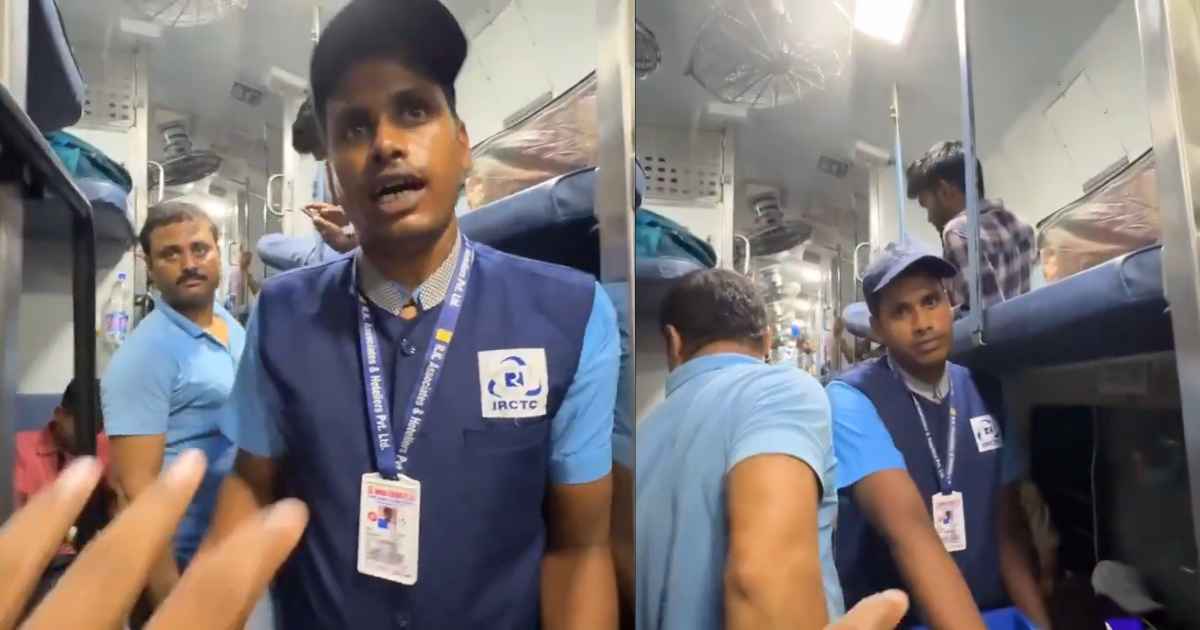Train travel in India is usually a mix of beautiful views, chai breaks, and that comforting plate of veg thali served by IRCTC. But sometimes, a small issue like wrong billing or extra charges turns a normal journey into a frustrating experience.
A similar incident recently went viral when a passenger, Sarfaraz Zain, shared a video of alleged overcharging on social media.
His complaint raised big questions about IRCTC’s catering system and how rules fail on the ground even after new reforms.
Passenger Claims Rs 80 Veg Thali Sold for Rs 120
Sarfaraz was travelling on Train 12554 (Vaishali Express) when he ordered a standard veg thali. According to IRCTC rates, the thali is priced at Rs 80, but he says he was charged Rs 120 instead.
Not only that — he alleged that:
- Some thali items were missing, including the sweet and salad
- Rail Neer bottle (which recently became cheaper due to GST changes) was not available
- The bill reportedly showed local water sold at Rs 20, which is not allowed under IRCTC rules
To highlight the issue, Sarfaraz posted a video on X (Twitter), tagging IRCTC and railway authorities. The video showed him questioning the catering staff, who struggled to justify the pricing.
His reference number 2025092302654 showed he filed an official complaint — something many passengers don’t know they can do.
Why This Overcharging Issue Created Huge Buzz
The timing of the complaint made it even more controversial.
Just one day earlier, the government had reduced prices of Rail Neer bottles:
- 1L — from Rs 15 to Rs 14
- 500ml — from Rs 10 to Rs 9
Passengers expected lower prices, but Sarfaraz’s experience showed the opposite. His video highlighted the difference between policy announcements and actual implementation inside trains.
This is not a new issue. Many passengers have complained earlier about:
- Vendors adding extra charges
- Missing food items
- Poor-quality meals
- Local water sold instead of Rail Neer
- No bill being provided
In fact, IRCTC’s internal reports show thousands of catering complaints every year, and a big chunk of them are about pricing.
IRCTC Responds Immediately to the Viral Video
One thing IRCTC has improved in recent years is its fast social media response.
Within hours of the post going viral, IRCTC replied:
“The matter has been taken into cognizance, and the concerned officer has been informed for necessary action.”
A later update from IRCTC stated:
- Punitive action was taken against the service provider
- A strict warning was issued
- The employee involved was instructed to be removed
- Monitoring was increased for that route
This response gave relief to passengers who often feel helpless when overcharged.
Public Reaction: Mixed Anger, Support, and Humour
As usual, social media exploded with reactions. People appreciated Sarfaraz for raising his voice and also shared their own train-food experiences.
Some key reactions:
- Users complained about being charged extra on various trains
- Many said vendors often give excuses when Rail Neer is not available
- Some joked that soon even the train whistle would have a “service charge”
- Others demanded digital billing, QR-code receipts, and stricter checks
The comments clearly showed that many passengers face the same problem, but only a few raise their voice.
Why Do These Overcharging Problems Continue? My Opinion
Even after reforms, these issues keep happening because:
- IRCTC vendors are outsourced, not directly controlled
- Many pantry cars have low monitoring
- Staff changes frequently
- Some vendors take advantage of passengers who don’t know the official prices
- Lack of audits on smaller routes
IRCTC handles millions of passengers daily, so ensuring perfect service everywhere is difficult. But with digital payments and online monitoring, things can improve faster if strict steps are taken.
How Passengers Can Protect Themselves from Overcharging
Here are simple steps every train traveller should follow:
Know the Prices
IRCTC rate cards are available online. Check once — it helps.
Always Ask for a Bill
Every meal served is supposed to come with a printed bill.
Report Immediately
You can complain through:
- Rail Madad app
- Helpline 139
- Twitter/X tagging @IRCTCofficial
- PNR-linked grievance system
Use E-Catering
Ordering through the IRCTC app ensures fixed rates and better accountability.
Conclusion
The IRCTC overcharging complaint by Sarfaraz Zain is more than just a single incident — it represents a larger problem many passengers face daily. The quick action by IRCTC is a positive sign, but real improvement will come only when:
- Vendors follow rules strictly
- Passengers demand bills
- Digital billing becomes compulsory
- Regular audits happen across all routes
Train journeys should feel safe, fair, and comfortable. Raising awareness is the first step towards change — and this incident has once again sparked the conversation India needs.
FAQs
What is the actual price of the IRCTC veg thali?
The official price of the standard veg thali is Rs 80, including roti, rice, dal, sabzi, curd, pickle, salad, and a sweet.
Can vendors sell local water on trains?
No. Only Rail Neer or approved branded water is allowed. Selling local water is against IRCTC rules.
How can passengers report overcharging?
You can report through:
- Rail Madad App
- Helpline 139
- Directly tagging IRCTC on X/Twitter
- Registering a complaint using your PNR
Does IRCTC take action on such complaints?
Yes. In many cases, IRCTC takes strict action including warnings, fines, and removing the vendor or staff responsible.
Is overcharging common on Indian trains?
Yes, many passengers report similar issues. Pricing inconsistency and missing items are among the most common problems.

